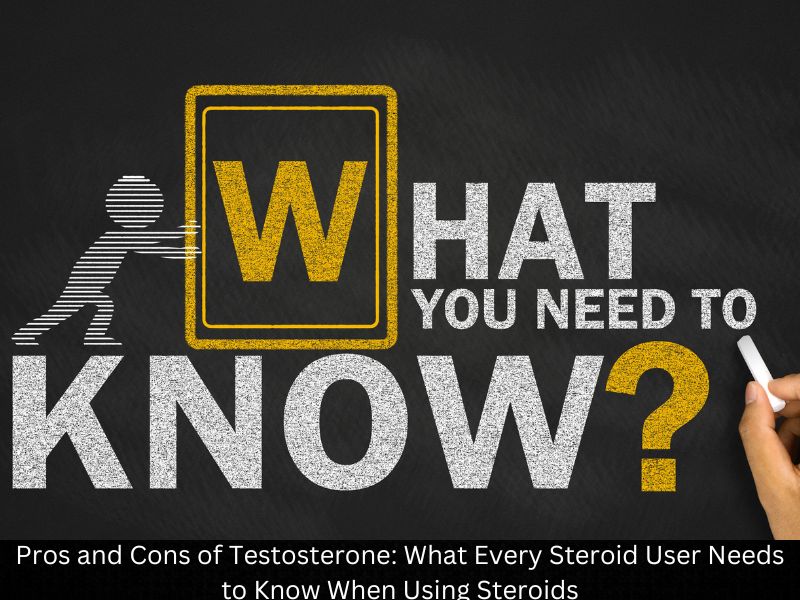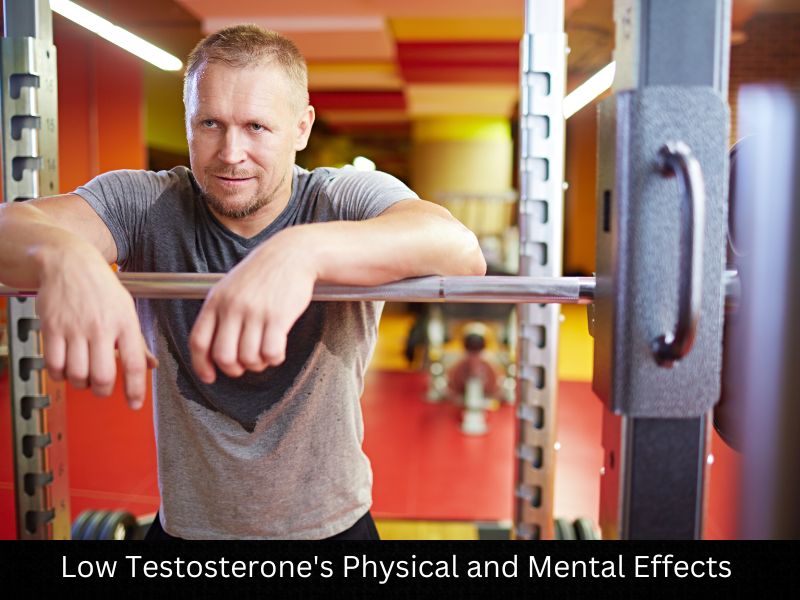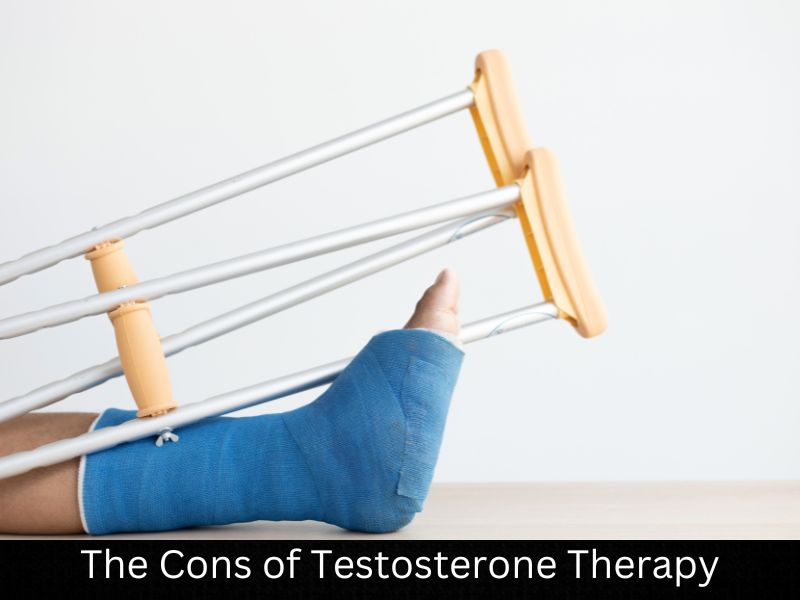Pros and Cons of Testosterone: What Every Steroid User Needs to Know When Using Steroids

[toggle title=’Click to show/hide spoiler’]
Cultural narratives have a significant impact on the direction of our life. Even when we know they are false or harmful, it can be difficult to let them go. Many of those cultural narratives for men are linked to testosterone and the traits it is said to imbue—strength, energy, vitality, and sexual prowess. Indeed, “testosterone” has become a catch-all term for masculinity. As a result, when a man suffers from low testosterone, it might be embarrassing.
However, low testosterone is not a reflection of your manhood and should not be considered a source of guilt. It is a medical issue that can affect any man, especially as he ages. And this medical problem is frequently accompanied by a slew of symptoms that can be exhausting, unpleasant, and even painful. Fatigue, melancholy, anxiety, painful bodily changes, and loss of desire in sex are all common side effects of low testosterone.
To start healing from low testosterone, you must first recognize the symptoms, accept a diagnosis, and seek the appropriate treatment. The most common treatment for most guys is testosterone therapy. Only testosterone therapy has been shown to consistently increase men’s testosterone levels, providing them the energy they need to live the lives they want. Of course, this isn’t for everyone, and there are testosterone therapy benefits and drawbacks to consider. Increasing your awareness is the first step in making a decision.
Understanding Low Testosterone
Men’s testosterone levels vary naturally. That level is normally between 300 and 1000 ng/dL. When you fall below that level, you are deemed to have low testosterone and may experience physical and emotional problems. These changes are obvious and apparent for some males. Others, on the other hand, find them subtle and readily dismissed. However, their intensity is likely to worsen over time.
The aging process is one of the most common causes of decreased testosterone in men. Testosterone production typically begins to fall in your late twenties and continues to decline at a rate of about 1% every year. While this is a natural fall, it is not always benign; up to 40% of men over the age of 45 have clinically low testosterone levels. Of course, age isn’t the only factor. Low testosterone can also be caused by:
- Testicular damage
- (Both) testicles are removed.
- Pituitary gland dysfunction
- Chemotherapy
- Medicine Reaction
- Hypogonadism from birth
- A genetic disease that causes chronic low testosterone levels
Low testosterone has also been linked to illnesses such as obesity, diabetes, and high blood pressure.
Low Testosterone’s Physical and Mental Effects

Testosterone is involved in a wide range of physiological functions. According to the National Institute of Health, “it is thought to regulate sex drive (libido), bone mass, fat distribution, muscular mass and strength, and the creation of red blood cells and sperm.” Because of its broad impact, insufficient testosterone can cause a slew of primary and secondary symptoms.
Among the signs of low testosterone are:
- Fatigue
- Disruptions in sleep
- High sex drive
- Low power
- Concentration problems
- Memory problems
- Anxiety
- Depression
- Irritability
These symptoms, in addition to being distressing in and of themselves, can lead to major long-term difficulties such as obesity, diabetes, and other health diseases. Low testosterone symptoms can also have serious emotional and social consequences, such as low self-esteem and disruptions in your most essential relationships. Indeed, your entire functionality may be harmed, and the consequences may reverberate throughout your life.
Testosterone Therapy Pros and Oxymetholone(Anadrol) Cons
Because testosterone therapy is believed to be the most effective treatment for low testosterone and can alleviate many of its symptoms and side effects, it is usually a very appealing alternative. Unlike over-the-counter testosterone “boosters,” testosterone therapy is recommended by a doctor and employs exogenous testosterone to restore levels to normal. However, like with any medical procedure, you should be informed of the advantages and disadvantages.
The Pros of Testosterone Therapy
There are numerous advantages to testosterone therapy. “Reports indicate that TRT may offer a wide range of advantages for men…including improvement in libido and sexual function, bone density, muscular mass, body composition, mood, erythropoiesis, cognition, quality of life, and cardiovascular disease,” according to a 2009 metareview. It frequently means:
- Enhanced energy
- Increased sexual drive
- improved mood
- increased concentration
- improved sleep
- Muscle mass has increased.
In other words, testosterone therapy restores what you lost when your testosterone levels dropped.
The Cons of Testosterone Therapy

There are risks and adverse effects to every medical treatment that may exceed the benefits for some patients. Testosterone therapy is no exception. Most males experience only minor side effects. Acne, swelling of the breasts or ankles, and breathing problems while sleeping are all reported by a tiny proportion of men. These, however, are uncommon.
More importantly, testosterone replacement therapy may have long-term health consequences for some men. TRT was once thought to have an effect on prostate health in particular. However, research findings have been inconsistent, and a 38-year meta-review indicated that while men receiving testosterone therapy were more likely to identify prostatic events, they were not more likely to develop prostate cancer. Data on the effect of testosterone therapy on cardiovascular health is equally conflicting, with a few studies indicating that it may raise the risk of cardiovascular events and many others indicating that it may reduce the risk of cardiac events.
Given these inconsistent findings, you should consult with your doctor to determine the best course of action. Furthermore, testosterone therapy can lower sperm count and impair fertility throughout treatment. As a result, it is not advised for men who intend to father biological children in the future.
Expert Guidance Can Help You Avoid Cons
If you are experiencing symptoms of low testosterone, the first step toward healing is to consult with a hormone health specialist. They can make sure you have the tests you need to figure out whether your symptoms are due to your testosterone levels or something else. They can also help you weigh the advantages and cons of testosterone therapy for your specific circumstances and determine if you are a good candidate based on your symptoms, goals, and health state. If testosterone therapy is the best option for you, they can assist you in exploring your treatment options in order to maximize your outcomes while minimizing adverse effects.
Whatever treatment technique you choose, the end goal should be to feel your best. You can reclaim your vitality and enjoy a healthier, more happy life with the correct strategy and assistance.
[/toggle]
